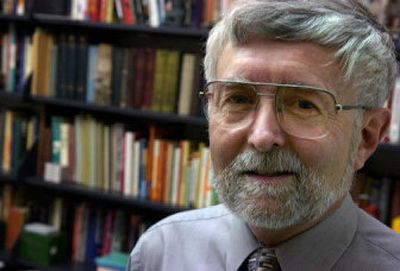Professor finds Liberia voters ‘inspiring’

The biggest symbol of democracy may not be your mark on a ballot. It might be your wait in line at the polling station.
At least that’s what Whitworth professor John Yoder suggests, after his firsthand observations of Liberia’s first elections in eight years.
As Yoder monitored Liberia’s elections Oct. 11, he noticed something that was far different from elections here – where mail voting is becoming the norm and where you could hear crickets at your local polling place on Election Day.
Liberians, whose country has been wracked by stolen elections and civil war for decades, stood for hours waiting to vote for one of 22 presidential candidates. At the first polling place Yoder visited, some people had been in line overnight. They stood there peacefully, he said, despite their myriad political differences.
“The schoolyard was absolutely full,” Yoder said. “There were several thousand people waiting to vote. It was really inspiring.”
To Yoder, that long line of voters contrasts with the shift toward more isolated voting here. He lives in a mail-only district, and a Spokane County advisory ballot measure Tuesday asks residents their opinion about going mail-only countywide. Supporters of the proposal say it would save tens of thousands of dollars every election, and Washington voters have been voting by mail in greater numbers with every election anyway.
But Yoder finds himself “disgusted” with the process, because it’s isolating, and it reduces the physical spectacle of the people gathered to express their voice, he said.
“I think there’s something very important about coming together and facing each other and exercising your vote,” he said.
Liberians will hold a runoff for the top two candidates Tuesday – just as Washington residents go to the polls here. Yoder flew back this week to monitor the votes again, and he’s optimistic that Liberia may be on the right path. One major sign of that won’t be who wins – it will be who loses, and how they take it.
“The main thing about any election, especially in Africa, is that somebody loses and is willing to accept that loss,” Yoder said.
Bad losers can become coup leaders, civil warriors and election stealers. Liberia is working through a peace process that followed 14 years of civil war, and Yoder said it feels critical for the country to get it right.
According to the Carter Center, civil strife and an ingrained system of political patronage have continued, but both finalists for the presidential post – Ellen Johnson-Sirleaf and George Weah – are running on platforms of reform.
“I think the people of Liberia realize, if we don’t get this election right, we might be blowing our last chance,” he said. “They really do see the election as the only alternative to civil war.”
Yoder, who taught in Liberia in the 1980s and has written a book about the country, is among about 25 election monitors put together by President Jimmy Carter’s Carter Center.
In the Oct. 11 election, Yoder and the others monitored the balloting, interviewed voters and officials to evaluate fairness, watched polling sites, monitored transportation and counted ballots.
Their conclusion, so far, is that the elections have been fair and uncoerced, Yoder said, with respectful campaigns and a lack of intimidation. Liberians have voted twice before, but the legitimacy of the votes was in doubt, said Yoder. He’s leaving late this week for the long series of plane rides to Africa.
“It’d just be a heck of a lot easier to stay here, but this is really an historic time,” he said. “Liberia has never had a good election.”